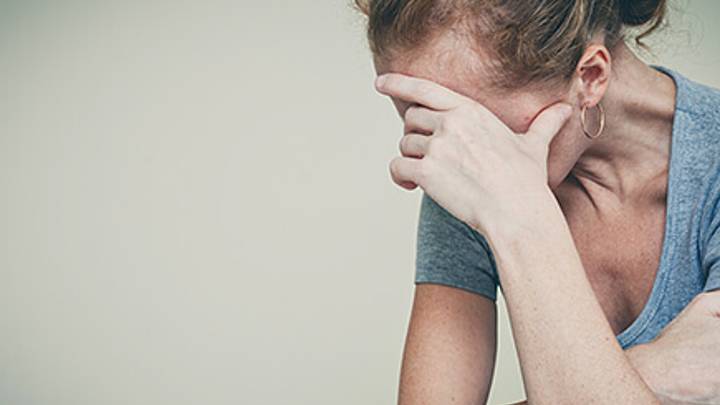Premenstrual Dysphoric Disorder
Premenstrual dysphoric disorder (PMDD) is a type of severe premenstrual syndrome (PMS). The symptoms can be physical and emotional, but with PMDD, the emotional symptoms often include severe mood swings that can potentially affect your work and relationships. Although doctors don’t know the reason for PMDD, the symptoms can often be managed with a combination of medication and lifestyle changes.

What is PMDD?
PMDD is a collection of symptoms, known as a syndrome, that affects some women in the lead-up to their menstrual period. The symptoms are similar to PMS symptoms, but more severe and sometimes disabling, affecting everything from your social life to your job. As well as being more intense, the main symptoms of PMDD are often more psychological than PMS, which can potentially make it a distressing condition to experience. Around 2 to 10 percent of menstruating women are thought to have PMDD, and women who have a history of depression are more likely to experience it.
What are the symptoms of PMDD?
Like PMS, PMDD symptoms can vary, starting from around seven to ten days before your period. The symptoms may change from one cycle to another, and they can continue a few days after your period starts. The emotional symptoms of PMDD can include:
- Feeling sad and/or hopeless
- Anxiety or tension
- Severe mood swings
- Being more angry and irritable than usual
- Arguing with people more than normal
- Losing interest in everyday activities
- Difficulty in concentrating
- Fatigue
- Changes in your appetite
- Feeling overwhelmed, as if life is out of control
- Sleep problems
You might also experience physical symptoms like bloating, breast tenderness, headaches, joint and muscle pain.
What can cause PMDD?
The cause of PMDD is unknown, but experts think that it’s a result of the way your hormones interact with chemicals called neurotransmitters in the brain. The levels of hormones produced by women with PMDD aren’t any different to women who don’t have the condition; their brain just reacts to normal fluctuating hormones differently. PMDD isn’t linked to any specific personality traits or stress. Although women with PMDD can often experience stress, the PMDD is likely the cause of the stress, rather than the stress causing the condition.
Can you test for PMDD?
There isn’t a definitive test for PMDD but as a general rule, if;
- you have five of the main symptoms above
- you notice them in the seven days leading up to your period
- they disappear within a few days of the start of your period
- the symptoms are seriously affecting your relationships and daily life,
you could have PMDD. If you feel like this most or all of the time and the symptoms don’t improve once your period starts, it’s unlikely PMDD causes them.
Before your doctor diagnoses PMDD, they will talk to you about your mental health to find out how you're feeling generally and make sure there's nothing else going on emotionally that could be making you feel the way you do. You might also be tested for conditions like endometriosis, fibroids or hormonal conditions or menopause. You’ll be asked to keep a diary of your symptoms for a while so that they can be looked at along with your menstrual cycle for any patterns.
What treatment is there for PMDD?
There are four main approaches to treating the symptoms of PMDD:
Medication
Some of the physical symptoms can be treated with over-the-counter medicines:
- Painkillers such as aspirin or ibuprofen for headache, breast tenderness, aches and pains or cramps
- Over the counter diuretics (water pills) can relieve the bloating from fluid retention
There aren’t any specifically licensed drugs for treating the anxiety caused by PMDD, but your doctor may recommend you try an anti-anxiety medication to see if that helps.
A type of antidepressant called a selective serotonin reuptake inhibitor (SSRI) can effectively treat PMDD.
Hormonal medicines such as oral contraceptives can be used to prevent ovulation, which stops PMDD symptoms. Sometimes progesterone or oestrogen have been used to help to relieve symptoms, but whether this approach works isn’t clear.
Counselling
Professional counselling can help some women find ways to cope with their PMDD. Complementary therapies including relaxation, meditation, yoga and reflexology can also be useful, although there isn’t much evidence to prove whether they work or not.
Nutrition
Some experts think that limiting your salt, caffeine, sugar and alcohol intake helps women with PMDD, along with taking dietary supplements including vitamin B6, vitamin E, calcium and magnesium. It might help – there haven’t been enough studies to prove or disprove this.
Although exercise like walking or swimming is known to help PMS symptoms, it’s unknown whether exercising can help the psychological symptoms you get with PMDD.
Is there a cure for PMDD?
The only permanent treatment for PMDD is a hysterectomy, which is only advised iIn very extreme circumstances, if nothing else has worked. There’s no one-size-fits-all guaranteed treatment for the condition, as it affects different women in different ways.
Is PMDD a mental health illness?
Since 2013 PMDD has been formally recognised by the Diagnostic and Statistical Manual of Mental Disorders. Still, critics have disagreed with this, saying that categorising PMDD as a mental illness contributes to stereotypes about women’s ‘emotional instability’.




IMC-Number: 429637

IMC-Number: 425122



